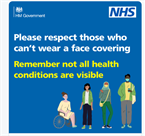Opinion Piece: Professor Ellen Townsend, of the School of Psychology, outlines the many reasons why some people may not be using a face covering and urges everyone to show kindness and compassion.
How do you think you might react when you see someone not wearing a face covering inside a building on return to campus? Will you be angry? Shocked? Panicked? It may be that you feel all of these things and given the woeful messaging from the government about the wearing of face coverings, and exemptions, none of these reactions would surprise me.
The government has spectacularly failed to communicate the message about exemptions from wearing face coverings and what constitutes a reasonable excuse. I’ve found just two messages on social media from the Department of Health and Social Care reminding the public that some people have valid exemptions (and not to challenge them), but countless adverts everywhere telling people that they must wear a mask (with no mention that there are valid reasons for those exempt not to wear one).
I think most people realise that you are exempt if you have an underlying medical condition such as asthma or a physical disability. However, many conditions and disabilities (such as autism) are hidden, as are mental health problems and trauma. These too are reasonable excuses. Those who have suffered abuse may be unable to wear a mask and might have distressing flashbacks if they try to do so. This has been highlighted by some rape crisis charities. Government guidance states that you are exempt if ‘… putting on, wearing or removing a face covering will cause you severe distress.’ I have had people from all walks of life contact me to say how terrified they are of going out without a mask for fear of being challenged or abused. It has become life-limiting for some.
I’ve heard of people being confronted in schools, shops and other public spaces: sometimes they are asked to produce an exemption card or medical evidence. This is not required in law – in fact a person asking to see this evidence themselves may be in conflict with the law. It is very important for staff and students to be aware that the new face covering regulations do not supersede other critical rights protecting against invasion of privacy and disability discrimination.
Essentially, the Equality Act 2010 trumps the face-covering law and a person with a disability could take the person conducting a challenge to court – fines up to £9000 are possible for such discrimination. (Hence, the government advises shops and businesses not to challenge people.) Anyone standing up for the person being challenged is also protected under the EQA2010.
Government guidance states: ‘Those who have an age, health or disability reason for not wearing a face covering should not be routinely asked to give any written evidence of this, this includes exemption cards. No person needs to seek advice or request a letter from a medical professional about their reason for not wearing a face covering.
‘Some people may feel more comfortable showing something that says they do not have to wear a face covering. This could be in the form of an exemption card, badge or even a home-made sign.
This is a personal choice and is not necessary in law.’
Some people may choose to wear lanyards to indicate their exemption, and you can find out more about the University’s sunflower lanyard scheme here. As noted above this is a personal choice, not required in law and we need to be mindful that many people with hidden conditions may be anxious about the fear of being labelled. As myself and other academic colleagues noted in the British Medical Journal recently ‘There are disturbing historical examples of such forced self-identification.’
So, rather than challenging people why not take a more compassionate and inclusive approach? Some shops and businesses have decided to put up signs that welcome customers in by saying. ‘This is an inclusive shop: ‘No mask? We won’t ask.’ Some supermarkets and shops have announcements reminding customers that there are hidden reasons that mean that people cannot wear a face covering and the Department of Health and Social Care have produced some (very) limited messaging around this.

Whether you are able to wear a face covering or not, my plea to all in these difficult times is to be kind and inclusive. If someone is not wearing a mask, you don’t need to challenge them – consider the courage it may take them to appear in public these days without one.
Ellen leads the Self-Harm Research Group in the School of Psychology. Much of her work focuses on children and adolescents from vulnerable backgrounds who are struggling with self-harm. Her research has influenced policy and practice on self-harm and suicide prevention for the NHS, PHE and the Samaritans.